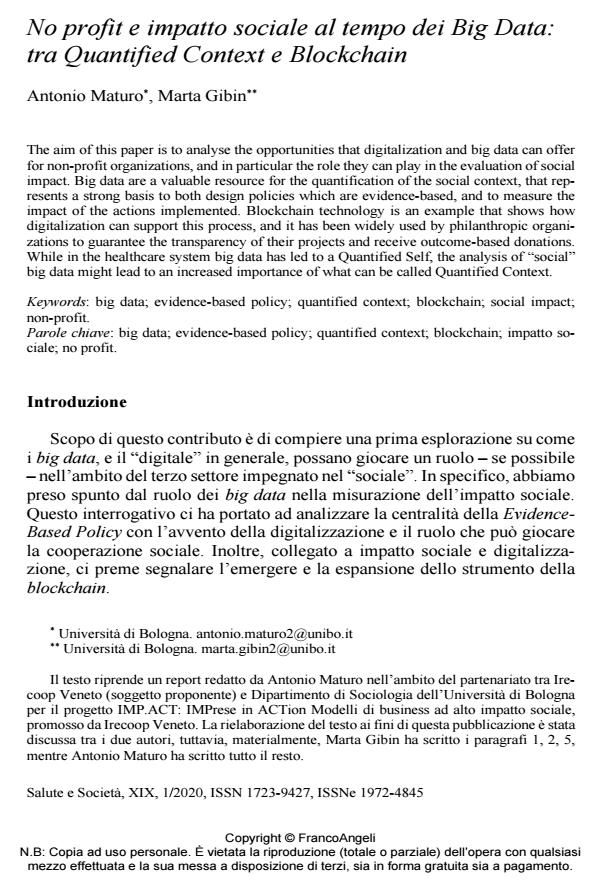No profit e impatto sociale al tempo dei Big Data: tra Quantified Context e Blockchain
Titolo Rivista SALUTE E SOCIETÀ
Autori/Curatori Antonio Maturo, Marta Gibin
Anno di pubblicazione 2020 Fascicolo 2020/1
Lingua Italiano Numero pagine 18 P. 157-174 Dimensione file 199 KB
DOI 10.3280/SES2020-001012
Il DOI è il codice a barre della proprietà intellettuale: per saperne di più
clicca qui
Qui sotto puoi vedere in anteprima la prima pagina di questo articolo.
Se questo articolo ti interessa, lo puoi acquistare (e scaricare in formato pdf) seguendo le facili indicazioni per acquistare il download credit. Acquista Download Credits per scaricare questo Articolo in formato PDF

FrancoAngeli è membro della Publishers International Linking Association, Inc (PILA), associazione indipendente e non profit per facilitare (attraverso i servizi tecnologici implementati da CrossRef.org) l’accesso degli studiosi ai contenuti digitali nelle pubblicazioni professionali e scientifiche.
The aim of this paper is to analyse the opportunities that digitalization and big data can offer for non-profit organizations, and in particular the role they can play in the evaluation of social impact. Big data are a valuable resource for the quantification of the social context, that represents a strong basis to both design policies which are evidence-based, and to measure the impact of the actions implemented. Blockchain technology is an example that shows how digitalization can support this process, and it has been widely used by philanthropic organizations to guarantee the transparency of their projects and receive outcome-based donations. While in the healthcare system big data has led to a Quantified Self, the analysis of "social" big data might lead to an increased importance of what can be called Quantified Context.
Parole chiave:big data; evidence-based policy; quantified context; blockchain; impatto sociale; no profit.
- Big Data, Intelligenza Artificiale e Valutazione: cosa accade in Italia Francesco Mazzeo Rinaldi, Ornella Occhipinti, in RIV Rassegna Italiana di Valutazione 85/2024 pp.185
DOI: 10.3280/RIV2023-085010
Antonio Maturo, Marta Gibin, No profit e impatto sociale al tempo dei Big Data: tra Quantified Context e Blockchain in "SALUTE E SOCIETÀ" 1/2020, pp 157-174, DOI: 10.3280/SES2020-001012